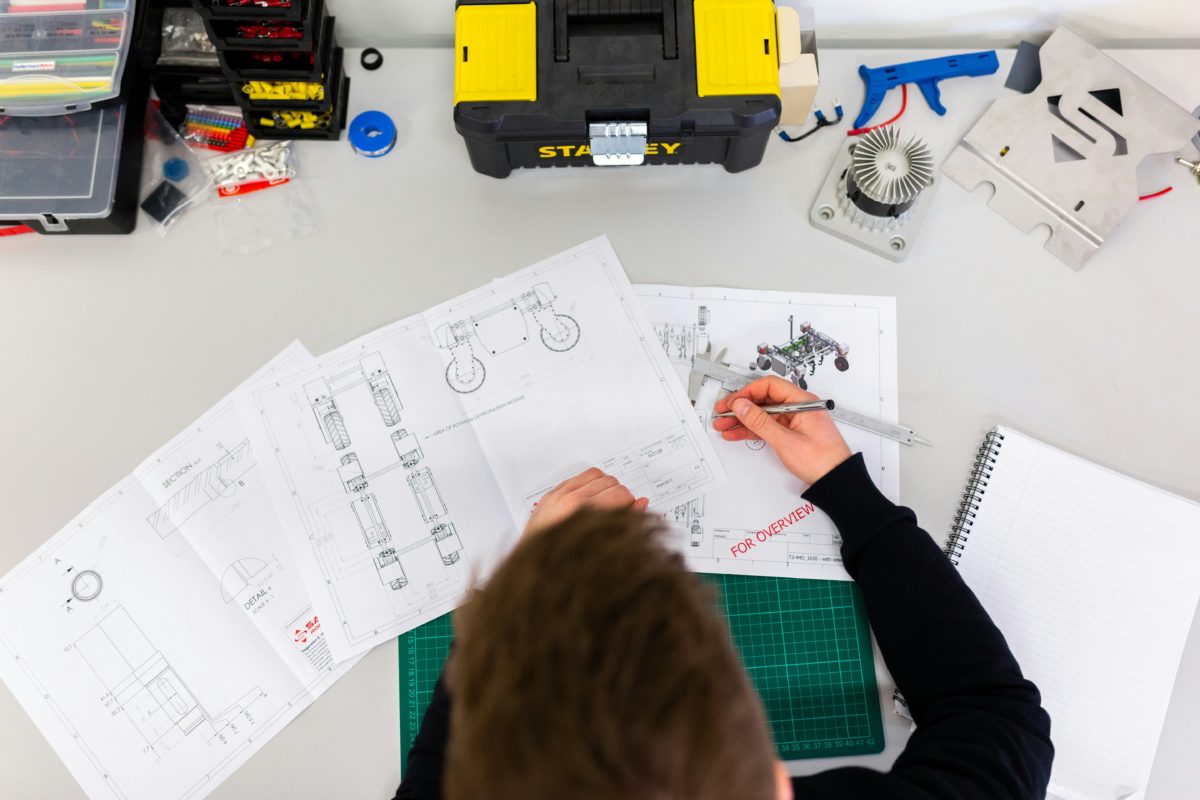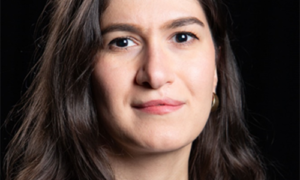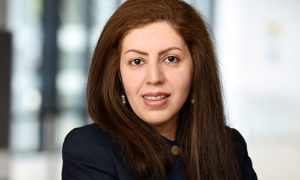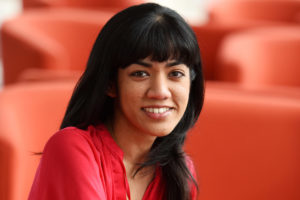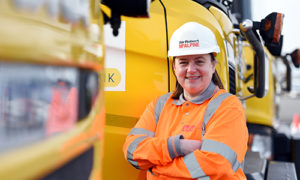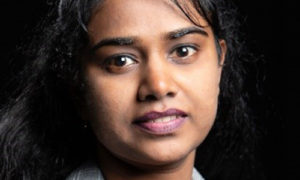International Women in Engineering Day (INWED), which is marked on June 23, celebrates the contribution to engineering from amazing women across the world.
At Teesside University, we’re proud of the many incredible women who have chosen a career in engineering.
We spoke a few of those who have forged successful engineering careers to share their insight into the industry.
Dr Eman Omairey
What does your role involve?
I am a civil engineering lecturer and course leader for civil and structural engineering. My research focuses on developing innovative solutions to integrate modern technology into the asphalt pavement industry, aiming to create resilient and sustainable roads for the future.
My days are diverse, some days I could be conducting research meetings with students, preparing lectures, reviewing papers for scientific journals, other days are spent in the laboratory, either conducting practical sessions for engineering surveying classes, or working on my research. I love my job as it offers a balanced and varied schedule. It enables me to grow professionally while witnessing my students’ progress and career development, which is immensely satisfying.
What does International Women in Engineering Day mean to you?
International Women in Engineering Day is a crucial reminder of the persistent gender gap in STEM fields. Identifying this gap is the first step toward finding effective solutions.
I remember participating in the Women in Engineering Student Conference in 2017 as a PhD student. At that time, I was shocked to learn that only seven percent of engineering positions in the UK were held by women. Although this percentage has since risen to 16 percent, there is still a long way to go. International Women in Engineering Day is just the beginning of this journey.
This day also celebrates the achievements of women in engineering and inspires young women at the start of their careers. These efforts are vital in fostering a more inclusive and diverse engineering community.
What advice would you give to other women considering a career in engineering?
My advice is to pursue it with full confidence. Remember, you are earning your rightful place in the field through your skills and determination. Increasing the percentage of women in engineering is crucial, particularly as the UK faces a technical skills shortage. By encouraging skilled and knowledgeable women to pursue engineering roles, we can address this issue and tap into a valuable human resource, ultimately strengthening the engineering sector.
Dr Tannaz Pak
What does your role involve?
I am an Associate Professor in Energy and Environmental Engineering, teaching a range of engineering undergraduate and masters courses. I also contribute to the management of our academic school, perform research, and supervise PhD students. My research is focused on novel methods for cleaning the environment, particularly our soils and water, from pollutants and development of sustainable energy resources.
What does International Women in Engineering Day mean to you?
INWED and the weeks leading up to this important day provide opportunities to recognise the contributions of women in engineering. It creates space to celebrate the hard work, dedication, and resilience of women engineers in a global context. INWED helps in pushing imposter syndrome back, through sharing the personal journeys and achievements of fellow female engineers.
It also puts a spotlight on the challenges women face in engineering roles, including, but not limited to, unequal opportunities and gender bias. Raising awareness is a key step towards achieving an inclusive and supportive workplace for everyone.
What advice would you give to women considering a career in engineering?
Seek support and mentorship and be focused on your professional development by joining engineering professional institutions, and build your own network.
While there are many aspects which could be discussed, including biases and stereotypes around the contribution of women in engineering roles, I want to focus on work-life balance and the specific role women play in their families as primary caregivers to their children. While there is a common understanding of the challenges which mothers face, wearing both the mum and engineer hats, decisions are commonly made by men in such an underrepresented sector.
Modern societies that are more appreciative of the need for a balanced role for women in families will create space for more women pursuing physically and mentally challenging jobs such as engineering in the future. Until then, women will face challenges raising young families while fully engaging with engineering roles. Better awareness at management level can help create a more positive and supportive environment for female engineers. This will attract more women and girls to study engineering.
Have you faced any challenges and how did you overcome them?
My most recent experience has been taking leave from work to give birth to and care for my baby. While this has been the most rewarding experience of my life, it came with many challenges before, during, and after taking almost a year of leave. Becoming a mum has changed my life forever. If I am honest, like many other women, I struggle with leaving my baby to come back to work. It makes all the difference to have a support network around you at work who are willing to listen to your concerns and are ready to come up with creative solutions to help out.
I am lucky to have had fantastic support from my head of department and Dean of our school in making the transition into and out of maternity leave more manageable for me. Taking a career break is always challenging and if not managed and supported well can lead to long term impacts on career plans.
Dr Samantha Gooneratne
What does your role involve?
I am the Principal Lecturer for Staffing and Resources in Engineering. My role involves supporting the Head of Department with managing the workloads of approximately 70 academics, and liaising with timetabling and technical teams to make sure all the department’s business needs are met. Even though my role might not seem like that of a traditional engineer, I use my engineering mindset on a daily basis – coming up with creative ways to solve problems and keep everything running smoothly.
Outside of my management role, I teach reaction engineering and process simulation to undergraduates on bachelor’s and integrated master’s courses and apprenticeships in chemical engineering, and I engage in pedagogic research, exploring ways to make higher education activities more authentic and effective.
What does International Women in Engineering Day mean to you?
International Women in Engineering Day is an opportunity for us to reflect on our journey to becoming a more inclusive industry – to celebrate the advances that have been made, and to identify what we still need to work on. Attitudes towards women in engineering have changed for the better, but there are still systemic and cultural biases that affect all of us, regardless of where we are in our careers. Celebrations such as INWED give us an opportunity to champion women working in the sector whilst countering some of the damaging myths and biases that unfortunately still exist.
What advice would you give to women considering a career in engineering?
Historically, the drive to get more women into engineering has focused on having more visible role models. Whilst this is definitely important, I think a bigger factor is self-efficacy. If you believe you can do something, then you find a way to do it – regardless of what challenges you may face. So my advice to women considering a career in engineering is – if the work interests you, do it! Don’t let the negative voices (either outside or inside your head!) discourage you…trust that you will figure out a way to quieten them.
Have you faced any challenges and how did you overcome them?
I think regardless of who we are or where we are in life, everyone faces challenges. Some of these challenges are internal (anxiety, confidence, imposter syndrome) and some are external (medical, personal, cultural). I try to address the challenges I face in the same way that I address any engineering problem I encounter – identify the contributing factors, develop a plan to resolve the issue, implement the plan, evaluate the success of the plan and modify as required!
Paula McMahon
I am an Honorary Professor of Teesside University, a civil engineer and graduate of Teesside University, currently working for Sir Robert McAlpine in a role which involves helping to look after part of the strategic road network. I love helping people work towards their professional qualifications and managing the social value project, where we do a variety of activities to help the community.
What does International Women in Engineering Day mean to you?
INWED is important to raise the profiles of women engineers around the world. To me, it is about celebrating the best, brightest and bravest women in engineering. However, it also gives us time to reflect on how far we have come and what we still need to do.
This year’s theme is #enhancedbyengineering showcasing women who enhance people’s everyday lives and are helping to build towards a brighter future.
What advice would you give to other women considering a career in engineering?
If you have some of the skills and lots of interest and enthusiasm, then what is stopping you? There is a wide variety of careers in engineering which can offer a rewarding career for life.
Have you ever faced any challenges due to being a woman in this industry and how did you overcome them?
Let’s not underestimate that everyone faces challenges and challenging people, but I do not doubt that I have had far more as a female engineer than a male counterpart of the same age.
I challenge issues as positively as I am able to. I let go the ones I was ill equipped to deal with at the time. And don’t dwell on those which were resolved satisfactorily. And most importantly I am kind to others and myself.
Dr Jenisha Charles
What does your role involve?
I am a lecturer in electrical/mechanical engineering and my expertise lies in the application of power electronics in renewable energy systems. Currently, my research focuses on electric vehicles and their charging systems. Teaching is my passion, and Teesside University provided the perfect opportunity to pursue this calling.
What does International Women in Engineering Day mean to you?
It is crucial, as it highlights and celebrates the contributions of women in a traditionally male-dominated field, fostering a more inclusive and diverse engineering community. It brings attention to the challenges women face in engineering, such as gender bias and underrepresentation, and encourages young girls to pursue STEM careers by showcasing successful female role models. For me, this day underscores the importance of gender equality and the value of diverse perspectives in driving innovation and solving complex problems. It inspires a commitment to supporting and advocating for women in engineering, ensuring they have equal opportunities to thrive and succeed.
What advice would you give to any other women considering a career in engineering?
Embrace your passion and curiosity, knowing that your unique perspective is incredibly valuable. Seek out mentors and role models who can provide guidance, support, and inspiration throughout your journey. Don’t be afraid to challenge stereotypes and advocate for yourself and other women in the industry. Build a strong network with peers and professionals, as collaboration and support can significantly enhance your experience and opportunities. Continuously develop your skills and knowledge and remain resilient in the face of obstacles. Remember, your contributions are vital, and you have the potential to make a significant impact on the world through engineering.
How does it feel to be a woman in such a male-dominated sector?
Being a woman in a male-dominated sector like engineering can be both challenging and rewarding. On one hand, it can feel isolating and daunting to be part of the less than 16 percent of women in the field. However, it also presents an incredible opportunity to break barriers and pave the way for future generations of female engineers. The sense of accomplishment and pride in contributing to a more inclusive and diverse industry is immensely gratifying. Each achievement not only advances your career but also challenges the status quo, inspiring other women to pursue and thrive in engineering. It reinforces the importance of perseverance, resilience, and the belief that diversity strengthens the innovation and success of the engineering sector.
Find out more about International Women in Engineering Day
Teesside University partnered with Enginuity and RWE Sofia Offshore Wind Farm to attract more women to study an engineering-related degree. Find out more here.

